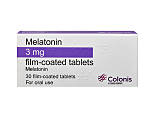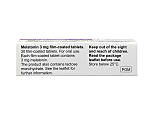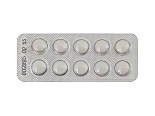Melatonin Tablets
Use melatonin to treat the symptoms of jet lag, like fatigue and sleep disturbances.








Prices from £27.00
In stock. Simply fill in a brief questionnaire. One of our doctors will review your order and prescribe a suitable treatment. How to Order
-
Melatonin tablets can be used for the treatment of jet lag in adults. This will allow you to travel without the worry of being too tired, or not getting enough quality sleep. The active ingredient in the tablets is melatonin. The recommended dose for adults and the elderly is 1 tablet each day for a maximum of 5 days in a row. Each tablet contains 3mg of melatonin. Should you not see improvements, you can take 2 melatonin tablets together.




About Melatonin
What are melatonin tablets?
Melatonin tablets are commonly used to treat jet lag. If you are flying long haul for a holiday or work trip, you may worry about getting jet lag.
Common symptoms of jet lag include:
- sleep disturbances
- fatigue
- daytime tiredness
- irritability
- concentration and memory problems
Jet lag can happen any time you travel quickly across two or more time zones. If you are travelling long distances across multiple time zones, you are more at risk of feeling sleepy and sluggish. It can take several days to fully recover from jet lag. Using melatonin tablets can help get rid of symptoms quicker.
Melatonin tablets are a manmade version of melatonin that can relieve jet lag symptoms. Melatonin is a hormone that naturally occurs in your body, which helps to manage your sleep patterns. Melatonin tablets can help you fall asleep quicker and make it less likely for you to wake up through the night.
How do melatonin tablets work?
Melatonin tablets work by helping to control your sleep cycle. When it gets dark, your body produces melatonin, which peaks in the early hours of the morning, and begins to reduce during daylight hours.
Melatonin acts on receptors in your body which promote sleep. When you take melatonin tablets, this adds to the natural supply of the hormone in your body.
-
-
The recommended dose is one 3mg melatonin tablet taken by mouth, after food. You should start taking melatonin on the first night that you arrive at your destination, 1 to 2 hours before you go to sleep. You can then take it around the same time for the following 2 to 3 days of your trip, if you feel you are still adjusting to the time zone. You can continue taking melatonin tablets daily for a maximum of 5 days. Make sure you swallow the tablet whole with a glass of water. Melatonin tablets should not be cut in half or crushed.
If you forget to take a melatonin tablet, take the next as quickly as you remember before you go to sleep. Alternatively, you can wait until it is time for the next dose, then continue as before. Never take a double dose to make up for the one you have forgotten.
If you have any questions, you should speak to your doctor or pharmacist about this medicine.
-
-
While some people may benefit from taking melatonin tablets to get rid of jet lag symptoms, there are other things you can do which can help.
Before you travel, it is important to rest as much as you can. Going to bed and getting up earlier or later than normal will help you adjust to the time zone of the destination you are travelling to.
During your flight, you should:
- drink lots of water to keep hydrated
- stay active by regularly walking around the cabin and stretching
- try and sleep if it is night time at your destination
- wear earplugs and an eye mask as they can help you sleep
Once you arrive at your destination, you should:
- set an alarm to prevent the risk of oversleeping
- go outside in the day, as natural light can help your body clock adjust
- alter your sleep schedule to the new time zone as soon as you can
Although there is no official treatment for jet lag, there are certain steps you can take like these, as well as taking melatonin tablets which may get rid of symptoms quickly.
-
-
Before you start taking melatonin tablets, it is important you are aware of the side effects.
If you get any of the following serious side effects, you must stop taking melatonin tablets immediately and see your doctor. Should you get an allergic reaction, you must visit A&E straight away.
Serious side effects of melatonin tablets include:
- chest pain
- depression
- blurred vision
- vertigo (a feeling of dizziness)
- disorientation
- fainting or loss of consciousness
Uncommon side effects of melatonin tablets include:
- restlessness
- insomnia
- anxiety
- itching
- dry skin
- high blood pressure
- indigestion
- yellowing of the skin or eyes (jaundice)
- abnormal liver function
- weight increase
If you get any of the side effects above and are concerned, do not hesitate to speak to your doctor or pharmacist. You should not take melatonin tablets if you are allergic to melatonin or any other ingredients in the medicine.
Speak to your doctor or pharmacist if you are currently taking, have recently taken, or plan to take other medicines alongside melatonin tablets.
These medicines include:
- fluvoxamine (used for the treatment of obsessive compulsive disorder and depression)
- thioridazine (used in the treatment of schizophrenia)
- cimetidine (used to treat stomach problems like ulcers)
- imipramine (used for the treatment of depression)
- benzodiazepines and non-benzodiazepine hypnotics (used to induce sleep like zopiclone, and zolpidem)
- oestrogens (used in hormone replacement therapy)
- adrenergic agonists (medicines used to control blood pressure)
To make sure melatonin tablets are safe for you to take, it is advised to speak to your doctor or pharmacist first if you:
- have kidney or liver problems
- have lupus, multiple sclerosis, or rheumatoid arthritis
- have been told by your doctor that you have an intolerance to certain sugars
- have any other autoimmune condition
Melatonin tablets can make you feel drowsy, so you need to be careful when taking the medicine. If you begin to feel drowsy, this may impair your ability to drive or operate heavy machinery.
You should not give melatonin tablets to children who are aged 18 years old or younger. This is because the medicine has not been tested with this age group and its effects are not known. Speak to your doctor or pharmacist for more information.
It is advised not to drink alcohol before, during or after you have taken melatonin tablets. This is because of the possible interactions with this medication. If you think you will struggle to stop drinking alcohol during treatment, your doctor or pharmacist can give advice and support.
If you are pregnant, thinking of having a baby, or breastfeeding, you should ask your doctor or pharmacist for guidance before taking melatonin tablets.
-
-
Each film-coated tablet contains 3mg of melatonin. The standard dose is 3mg (1 tablet) daily for a maximum of 5 days. The first dose should be taken upon arrival at your destination at the habitual bed-time.
Due to the potential for incorrectly timed intake of melatonin to have no effect, or an adverse effect, on re-synchronisation following jet-lag, Melatonin 3mg film-coated tablets should not be taken before 8pm or after 4am at destination.
Food can enhance the increase in plasma melatonin concentration. Intake of melatonin with carbohydrate-rich meals may impair blood glucose control for several hours. It is recommended that food is not consumed 2 hours before and 2 hours after intake of Melatonin 3mg film-coated tablets.
As alcohol can impair sleep and potentially worsen certain symptoms of jet lag (e.g. headache, morning fatigue, and concentration) it is recommended that alcohol is not consumed when taking Melatonin 3mg film-coated tablets.
Melatonin 3mg film-coated tablets may be taken for a maximum of 16 treatment periods per year.
Melatonin must not be used with any other sedative medications or sleeping tablets.
Melatonin can interact with other medications - please check with your doctor if you are taking any other medicines (prescription or over the counter).
Possible side effects of the medication
WARNING: Melatonin will cause drowsiness therefore should only be used at bedtime and not when drowsiness could pose a danger to your safety and well-being (e.g. if driving or using machinery).
Drowsiness/sleepiness, headache, and dizziness/disorientation are the most frequently reported adverse effects when melatonin is taken on a short-term basis to treat jet lag. Drowsiness, headache, dizziness, and nausea are also the adverse effects reported most frequently when typical clinical doses of melatonin have been taken for periods of several days to several weeks by healthy persons and patients. For a full list of side effects, please refer to the patient information leaflet.

Dr Kathryn Basford is a qualified GP who works as a GP in London, as well as with ZAVA. She graduated from the University of Manchester and completed her GP training through Whipps Cross Hospital in London.
Meet our doctorsArticle created: 28 Sept 2021
Last reviewed: 13 Jan 2023
-
Melatonin 3 mg film-coated tablets (June 2019) EMC (Accessed 14 September 2021)
-
Coping With Jet Lag and Sleepiness (January 2010) WebMD (Accessed 14 September 2021)
-
Jet lag (August 2020) NHS (Accessed 14 September 2021)
-
Melatonin: a manmade hormone used for short term sleep problems (November 2019) NHS (Accessed 14 September 2021)
-
Melatonin: Side Effects, Uses, Dosage (May 2021) Drugs.com (Accessed 14 September 2021)


GMC: 7074021

GMC: 6149061

GMC: 7085115


Whether you’re going on holiday or returning home, jet lag can make it difficult to manage your energy levels. Asda Online Doctor by ZAVA offers melatonin treatment that can help you correct your body clock and reduce the effect jet lag has on your day-to-day activities.





